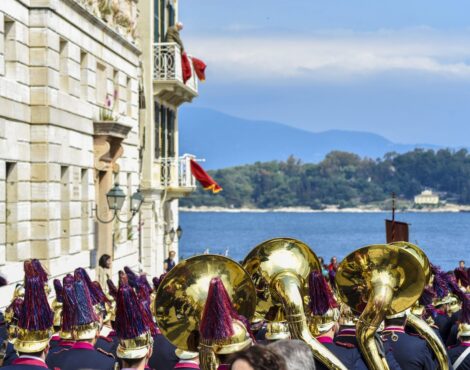Island Rhythms: How Music Shapes Daily Life in Corfu
Music in Corfu is not just an art. It is part of daily life, a language that expresses joy, memory and community. From the sound of a brass band passing through the old town to the quiet notes of a guitar in a village square, music fills the island with rhythm. Every celebration, every season and every corner of Corfu carries a melody that connects the past with the present.
A Living Tradition
Corfu has one of the richest musical traditions in Greece. The first philharmonic bands were founded in the 19th century, inspired by European music and supported by local families who saw art as a sign of culture. Today, every major town and many villages have their own band. They rehearse throughout the year and perform in parades, festivals and religious events.
These bands are more than musical groups. They are schools of discipline, teamwork and pride. Many children begin learning an instrument from a young age, joining the ranks of players who wear their red and blue uniforms with honor. Through music, they grow connected to their heritage and to one another.
The Sound of the Streets
Anyone who has walked through Corfu Town on a spring morning or during Easter knows the feeling of hearing brass instruments echo between the narrow alleys. The music is solemn yet full of emotion, turning the streets into a moving concert hall. Locals stop to listen, tourists take photos, and for a few moments, everyone shares the same rhythm.
Outside the big celebrations, smaller sounds fill the air. Accordion players at the markets, church choirs rehearsing in the evening, and neighbors singing traditional cantades from balconies all form part of the island’s soundtrack. The music is spontaneous, woven into the rhythm of everyday life.
The Cantades
One of the most beloved musical forms in Corfu is the cantada, a romantic serenade with roots in the Ionian tradition. Groups of singers, usually accompanied by a guitar or mandolin, perform songs about love, friendship and nostalgia. The melodies are gentle, and the lyrics often tell stories of old Corfu and the sea.
In summer evenings, especially in the old town, you might still hear cantades drifting through the alleys. People stop at windows to listen, and the music creates a sense of intimacy and timelessness. These songs are reminders that Corfu’s musical heart still beats softly behind the walls of the city.
Music and Faith
Religious life in Corfu is deeply connected to music. Every major feast, especially Easter, includes processions where philharmonic bands play slow marches while crowds follow in reverent silence. The blend of sacred ritual and musical expression creates a unique spiritual atmosphere.
In the churches, choirs sing hymns that mix Byzantine and Western elements. The sound is both familiar and rich, a reflection of Corfu’s history as a crossroads of cultures. For many locals, music is not only an art but also a form of prayer.
Festivals and Celebrations
Throughout the year, music brings people together. Summer festivals fill the villages with song and dance. In August, traditional fairs known as panigyria combine food, wine and live music until late at night. Musicians play violins, guitars and drums, and locals dance in circles, holding hands and smiling.
The bands also perform in civic ceremonies, national holidays and even funerals, marking every stage of life with sound. From birth to farewell, music accompanies the people of Corfu through their journey.
The Modern Scene
While the island treasures its traditions, it also embraces modern forms of expression. Young musicians blend jazz, rock and electronic styles with local influences. Cafes and bars host live performances, and music schools train new generations in both classical and contemporary sounds. The artistic energy of Corfu continues to evolve while staying true to its roots.
Music as Identity
What makes Corfu unique is how naturally music fits into its identity. It is not separated from daily life but lives within it. Families grow up with instruments in the house, and children often choose music as part of their education. The sound of a trumpet in the distance or a choir rehearsing at dusk is part of what it means to live here.
Music gives Corfu its emotional rhythm. It expresses love for the island, respect for tradition and joy in togetherness. Whether played in a grand parade or sung softly in a courtyard, it connects people to something larger than themselves the shared heartbeat of the island.
To understand Corfu, one must listen. The melodies that drift across the olive groves and echo in the old streets are more than sound. They are memory, emotion and life, flowing through the island like the wind from the sea.





